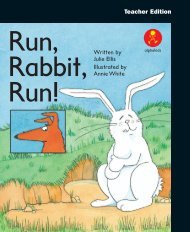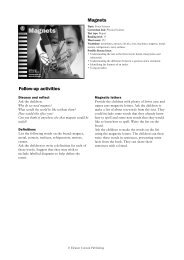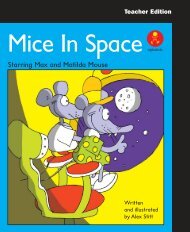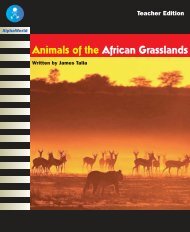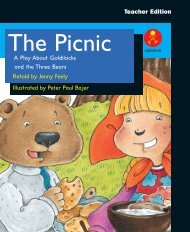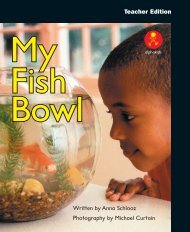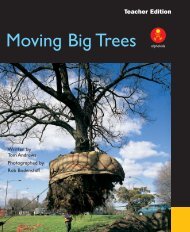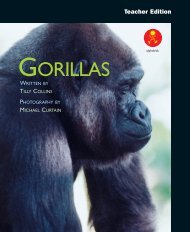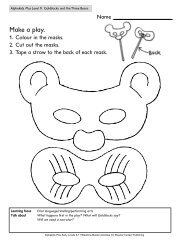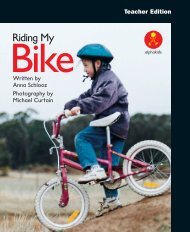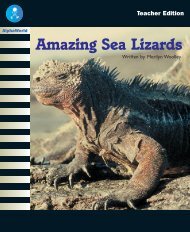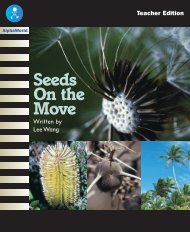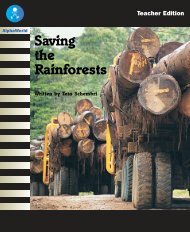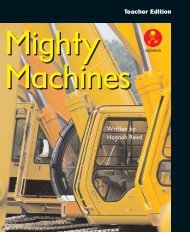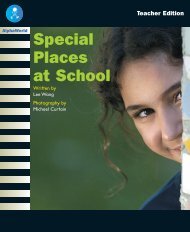Camping
Camping
Camping
Create successful ePaper yourself
Turn your PDF publications into a flip-book with our unique Google optimized e-Paper software.
Teacher Edition<br />
<strong>Camping</strong>alphakids<br />
Written by Sarah O’Neil<br />
Photography by<br />
Michael Curtain
Published edition<br />
© Eleanor Curtain<br />
Publishing 2004<br />
First published 2004<br />
Apart from any fair dealing for<br />
the purposes of study, research,<br />
criticism or review, as<br />
permitted under the Copyright<br />
Act of Australia, no part of this<br />
book may be reproduced by<br />
any process, or transmitted in<br />
any form, without permission<br />
of the copyright owner. Where<br />
copies of part or the whole of<br />
this book are made under Part<br />
VB of the Copyright Act, the<br />
law requires that records of<br />
such copying be kept and the<br />
copyright owner is entitled to<br />
claim payment.<br />
Developed by<br />
Eleanor Curtain Publishing<br />
Text: Kerrie Shanahan<br />
Consultant: Susan Hill<br />
Designed by<br />
Alexander Stitt<br />
Production by<br />
Publishing Solutions<br />
Printed in China<br />
ISBN 0 7253 3402 9<br />
1 2 3 4 5 6 7 8 9<br />
04 05 06<br />
?<br />
How to use this book<br />
Before reading: Talkthrough<br />
Talk through the book with the children. Encourage<br />
them to predict the text from the cover and the<br />
pictures, and to think about the information they<br />
provide. Direct the children’s attention to aspects of<br />
the text that may challenge them. Support the children<br />
to deal with these challenges by asking the<br />
Talkthrough questions on each page.<br />
During reading: Observe and support<br />
Observe the children as they read. Encourage them to<br />
monitor their own reading as they comprehend the<br />
text. As needed, support the children by helping them<br />
to discover and use reading strategies and cues to solve<br />
problems and respond to reading challenges that arise<br />
in the text. Interruptions to the children’s reading<br />
should be minimal and focused on specified learning<br />
needs.<br />
After reading: Comprehension, returning to<br />
the text, responding and writing links<br />
To further develop children’s understanding of the<br />
text, select from activities found on page 16 and the<br />
inside back cover. These whole text, sentence and word<br />
level activities reinforce the teaching focus of this<br />
book. Assessment ideas are provided to assist with<br />
planning for further teaching.<br />
Text highlights<br />
• The text follows a predictable pattern<br />
focusing on a day’s camping activities.<br />
• Direct speech is used throughout the book.<br />
Vocabulary<br />
breakfast, camping, fish, lunch, potatoes, sister,<br />
sleep, stars, toast, walking
Setting the context<br />
Have a class discussion about camping.<br />
Have you ever been camping? How long did<br />
you go for? Where did you sleep? How did<br />
you cook your food? What else did you do?<br />
Introducing the book<br />
This book is about a camping trip two girls<br />
went on with their father and how they got<br />
along without modern appliances. What<br />
things might you miss if you went camping?<br />
Front cover<br />
This book is called <strong>Camping</strong>. What things<br />
might the girls and their father do on their<br />
camping trip?<br />
Title page<br />
Read the title together. Point out the<br />
author’s and photographer’s names.
<strong>Camping</strong> Pages 2–3<br />
?<br />
Talkthrough<br />
The girls and their father are cooking toast on the fire. Have you<br />
ever cooked toast this way? Why would they need to cook their<br />
toast like this?<br />
Observe and support<br />
Can the children understand the inferences in the text?<br />
How did the family cook their toast? Why didn’t they use a<br />
toaster? What else could they cook on the fire?<br />
2
<strong>Camping</strong> Pages 4–5<br />
?<br />
Talkthrough<br />
The family is walking along a track. What does the sign say?<br />
What sorts of things would they have seen on their walk?<br />
Observe and support<br />
Do the children use a range of information to solve<br />
problems when they read?<br />
If a child has difficulty with a word, ask the following<br />
questions:<br />
What can you see that might help you work that word out? Do<br />
the pictures help? What does the word start with? What sound<br />
does that letter make? What sort of word would make sense<br />
here?<br />
4
<strong>Camping</strong> Pages 6–7<br />
?<br />
Talkthrough<br />
The girls’ father has caught a fish. How are they cooking the<br />
fish? Would you enjoy eating this fish? Why or why not?<br />
Observe and support<br />
Can the children read the text with expression?<br />
Can you make it sound like you are the person in the book?<br />
What does a question mark tell you about how to read a<br />
sentence?<br />
6
<strong>Camping</strong> Pages 8–9<br />
?<br />
Talkthrough<br />
The girls are going swimming now. Have you been swimming in<br />
a river like this?<br />
What would the water be like? Why?<br />
Observe and support<br />
Can the children identify the apostrophe and explain<br />
why it is used?<br />
Can you show me an apostrophe on this page? This is a<br />
contraction. Two words, let and us, are contracted to make let’s.<br />
Can you think of other words that have an apostrophe?<br />
8
<strong>Camping</strong> Pages 10–11<br />
?<br />
Talkthrough<br />
Now they are cooking dinner. What are they cooking? How are<br />
they cooking the potatoes? How are potatoes usually cooked at<br />
home?<br />
Observe and support<br />
Do the children use their knowledge of letter-sound<br />
relationships to help them read? You could make the<br />
following suggestions:<br />
Look at the first letter. What sound does this letter make? Look<br />
at the ending of the word. What word would make sense here?<br />
10
<strong>Camping</strong> Pages 12–13<br />
?<br />
Talkthrough<br />
The girls and their father are inside their tent. What are they<br />
looking at? Why are the stars so bright here? Do stars always<br />
look like this? Why not?<br />
Observe and support<br />
Can the children recall the events in the book?<br />
What did the family have for breakfast?<br />
What did they do after breakfast?<br />
What did they have for lunch? Where did they get this?<br />
How did they cook their potatoes?<br />
What did they do before they went to sleep?<br />
12
<strong>Camping</strong> Pages 14–15<br />
?<br />
Talkthrough<br />
Do you think the girls will sleep well? Why or why not?<br />
Do they look comfortable?<br />
Would you enjoy going camping?<br />
Observe and support<br />
Do the children notice if they have made a mistake<br />
when reading?<br />
I like the way you re-read that. What did you notice? What word<br />
would make sense here?<br />
14
<strong>Camping</strong> Page 16<br />
? Talkthrough<br />
What can this girl do now? How does she know how<br />
to make toast?<br />
After reading<br />
Being a meaning maker<br />
Encourage the children to support their responses<br />
with evidence from the book as they discuss these<br />
comprehension questions:<br />
What things did the girls and their father do to fill their day?<br />
Why did they sleep and sleep and sleep?<br />
How is this camping trip like living at home? How is it different?<br />
16
Being a code breaker<br />
Explore the following text features:<br />
• High-frequency words: a, can, for, go,<br />
I, in, it, my, said, was, we, went, you.<br />
• Grammar: explore what contractions<br />
are and how they are formed; for<br />
example, what’s, where’s.<br />
Being a text user<br />
Refer to the text when discussing these<br />
questions:<br />
What kind of book is this, fact or fiction?<br />
What does this book teach us about camping?<br />
Did you like this book? Why or why not?<br />
Being a text critic<br />
Do all children get to go camping?<br />
Is this the only way to go camping?<br />
Responding to text<br />
Ask the children to write a list of<br />
all the things the family did on<br />
their camping trip. Encourage them to<br />
check the accuracy of their lists by<br />
referring back to the book. Ask them to<br />
place the events on their lists along a<br />
timeline in the correct order.<br />
Ask the children to write a list of<br />
the equipment the family would<br />
have needed to take on their camping<br />
trip.<br />
The children could list words from<br />
the book under the categories of<br />
present and past tense.<br />
Present tense<br />
walk<br />
swim<br />
Past tense<br />
walked<br />
swam<br />
Writing<br />
Ask the children to innovate on the text<br />
by writing about the second day of the<br />
family’s camping trip.<br />
Assessment<br />
Can the children:<br />
• draw inferences about the text to say why the family in the story did not have a<br />
toaster?<br />
• explain what the apostrophe in words such as ‘let’s’ indicates?<br />
whole text activity sentence activity word activity
alphakids<br />
<strong>Camping</strong><br />
Written by Sarah O’Neil<br />
Photography by<br />
Michael Curtain<br />
Teacher<br />
Edition<br />
Other<br />
books<br />
at this<br />
level<br />
Making<br />
Making Spaghetti<br />
Written by Jack Hastings<br />
Spaghetti<br />
Photography by Michael Curtain<br />
alphakids<br />
Topic: Leisure and camping<br />
Curriculum link: Health and Physical<br />
Education/SOSE<br />
Text type: Recount<br />
Reading level: 9<br />
Word count: 189<br />
High-frequency words: a, can, for, go, I, in, it, my,<br />
said, was, we, went, you<br />
Vocabulary: breakfast, camping, fish, lunch,<br />
potatoes, sister, sleep, stars, toast, walking<br />
Possible literacy focus<br />
Inferring meaning from a text.<br />
Exploring how contractions are formed.<br />
Two<br />
Snakes<br />
alphakids<br />
Retold by Edel Wignell Illustrated by Marjory Gardner<br />
The<br />
Fox<br />
and the<br />
Snail<br />
alphakids<br />
Goldilocks and the<br />
Three<br />
Baby Bear<br />
Goes for Bears a Walk<br />
Retold by Jenny Feely<br />
Illustrated by Peter Paul Bajer<br />
Whales<br />
Written by Hannah Reed<br />
Illustrated by Liz Cogley<br />
alphakids<br />
alphakids<br />
Summary<br />
This book is about a camping trip two girls take with<br />
their father and how they got along without modern<br />
appliances.<br />
Retold by Edel Wignell<br />
Illustrated by Alex Stitt<br />
ISBN 0- 7253- 3402- 9<br />
9 780725 334024<br />
alphakids



